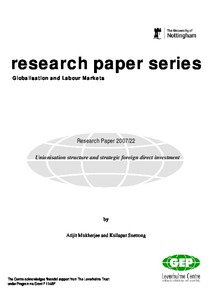Unionisation structure and strategic foreign direct investment
"It is often argued that if the substitutability between workers is sufficiently high, labour is better off under a centralised labour union than under decentralised unions. We show that this may not be the case in an open economy with foreign direct investment as the incentive for outward FDI...
| Main Authors: | , |
|---|---|
| Institution: | ETUI-European Trade Union Institute |
| Format: | TEXT |
| Language: | English |
| Published: |
Nottingham
2007
University of Nottingham |
| Subjects: | |
| Online Access: | https://www.labourline.org/KENTIKA-19291877124910190599-unionisation-structure-and-str.htm |
| Summary: | "It is often argued that if the substitutability between workers is sufficiently high, labour is better off under a centralised labour union than under decentralised unions. We show that this may not be the case in an open economy with foreign direct investment as the incentive for outward FDI is higher under a centralised union than under decentralised unions. If the number of firms undertaking FDI under a centralised union is higher than under decentralised unions, their wage rates charged by the labour union and the union utility may be higher under decentralised unions than under a centralised union, and the comparison may depend on the competitiveness of the industry. We also show that there are situations where both the domestic industry and the labour unions prefer decentralised unions over a centralised union." |
|---|---|
| Physical Description: | 26 p. Digital |

